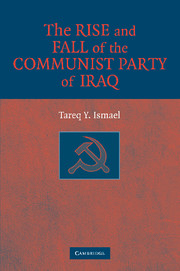Book contents
- Frontmatter
- Contents
- Preface
- 1 The Communist Party of Iraq: Origins and Foundations
- 2 Ascent of the ICP in Iraqi Politics
- 3 Party Rift: The Emergence of the Central Leadership
- 4 Alliance with the Baʿth
- 5 The Rebirth of the Central Leadership in the 1970s
- 6 Crisis: Disintegration or Renewal?
- 7 Conclusion: From Vanguard Activism to Rearguard Opportunism
- Index
3 - Party Rift: The Emergence of the Central Leadership
Published online by Cambridge University Press: 24 November 2009
- Frontmatter
- Contents
- Preface
- 1 The Communist Party of Iraq: Origins and Foundations
- 2 Ascent of the ICP in Iraqi Politics
- 3 Party Rift: The Emergence of the Central Leadership
- 4 Alliance with the Baʿth
- 5 The Rebirth of the Central Leadership in the 1970s
- 6 Crisis: Disintegration or Renewal?
- 7 Conclusion: From Vanguard Activism to Rearguard Opportunism
- Index
Summary
The Iraqi Communist Party remained popular with the Iraqi people despite the elimination of virtually its entire leadership and organization following the failed 1963 revolt. This allowed several attempts to rejuvenate the Party to take place. During the first few weeks after the 1963 Baʿthist coup, the remnants of the Central Committee and Politburo – Jamâl al-Ḥaidarî, Muḥammad Ṣâliḥ al-ʿAblî, and ʿAbd-ul-Jabbâr Wahbî – continued running Party affairs in Baghdad under the name the Bureau of Central Organization. They attempted to re-establish communication with the scattered membership of the embattled Party and began to rebuild the Party's apparatus. But, on 21 July 1963, they too were arrested and summarily executed.
To fill the vacuum that resulted and direct what was left of the Party, a replacement leadership was hastily constituted, led by Bâqir Ibrâhîm al-MÛsawî, the only surviving member of the Politburo in Iraq, who had been the Politburo official in charge of the Party's Middle Euphrates section. This state of confusion, however, did not extend to the Kurdish branch of the ICP, which, being located in the rebellious northern Kurdish areas, was left virtually intact. The branch had established good working relations with other Kurdish groups, particularly with the KDP and its leader Mullah Muṣṭafâ Bârzânî, who had initiated a rebellion against the Qâsim regime in 1961. After the Party's 1962 plenary session, Salâm ʿÂdil's Central Committee instructed the Kurdish branch to replace the Central Committee in case of an emergency or if for any reason it ceased to function normally.
- Type
- Chapter
- Information
- The Rise and Fall of the Communist Party of Iraq , pp. 114 - 165Publisher: Cambridge University PressPrint publication year: 2007

